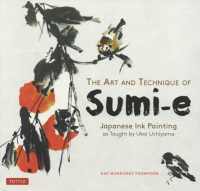- ホーム
- > 洋書
- > 英文書
- > Science / Mathematics
Full Description
Martin Heidegger, Gilbert Simondon, and Bernard Stiegler each argued in their own way that, ever since its inception in ancient Greece, western philosophy is incapable of thinking technics, which reaches its clearest expression in the philosophy of Immanuel Kant. According to Heidegger, Kant articulated the essence of modern technics as enframing (Gestell) without understanding the nature of his own insight, while Simondon claimed that transcendental philosophy is structurally incapable of thinking technics as its answer to the question of technics either comes too early (a priori) or too later (a posteriori). Stiegler synthesized both positions in his claim that Kant was incapable of acknowledging the technical constitution of his own consciousness. All three thinkers thus argue, in one way or another, that Kant was essentially incapable of seeing, understanding, let alone thinking, technics.
The intention of this book is two-fold. On the one hand, it argues that, despite Heidegger, Simondon, and Stiegler's inability of recognizing it, there is an explicit concept of technics at work in Kant's philosophy. This technics is however not a technics that was overlooked by Heidegger, Simondon, and Stiegler. Instead, this book shows that, from the Critique of Pure Reason (1780) until the posthumously published Opus Postumum (1796-1803), transcendental philosophy is at once constituted against, while at the same time relying upon, and proceeding from technics. On the other hand, this book engages with the broader relation between philosophy and technics. If there is indeed such a thing as a Kantian thought on technics, then Kant can no longer be considered philosophy's most prominent 'techno-oblivious' thinker. The question about the relation between Kant and technics is thus nothing less than a question about the relation between philosophy and technics as a whole.
Contents
Foreword: Howard Caygill (Kingston University, UK)
1. Introduction
1.1 Heidegger, Simondon, and Stiegler on Philosophy's Technical Aporia and Kant
1.2 Gerhard Lehmann and Wilfried Seibicke on technics in Kant
1.3 Introducing Technics from the Critique of Pure Reason until the Opus Postumum
2. Reason's Instrumentality and the Need for a Discipline
2.1 Kant's diagnosis of reason in the Critique of Pure Reason
2.2 Reason's Instrumentality and the Canon/Organon Distinction
2.3 Method, the Technical Part of Logic
2.4 A Discipline for Reason
3. Kant's Technical Objects
3.1 Mechanisms and Automatisms
3.2 Two Touchstones of Truth
3.3 Guiding Threads, 'thirds', Schemata
3.4 The Compass
4. Cosmo-technics in the Opus Postumum
4.1 Technical-practical Reason and the Technical Power of Judgment
4.2 Technical-practical Reason in the System of Transcendental Philosophy
4.3 On Positing
4.4 God, the World, and the Human
4.5 Technical-practical Reason and the World
4.6 Styx Interfusa Coërcet: The Transition
5. Conclusion
5.1 Kant and the History of Technical Thought
5.2 Kant and Heidegger, Simondon, and Stiegler








